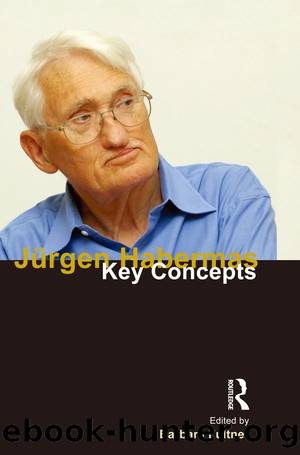Jurgen Habermas by Fultner Barbara;

Author:Fultner, Barbara;
Language: eng
Format: epub
ISBN: 1886909
Publisher: Taylor and Francis
Ethical authenticity and the good life
As a moral theory, Habermasâs discourse ethics is predicated on a conviction shared by many moral philosophers today, namely that philosophy is no longer in the position to dictate a comprehensive theory of the good life that is both informative and universally valid (see IO: 3â46; Habermas 2003b: 1â15). Habermas thus carves out the moral domain from its traditional setting, the encompassing set of issues that have to do with flourishing, happiness and the good life, and restricts the task of moral theory to the reconstruction of the âmoral point of viewâ from which we can impartially justify (and apply) norms for the treatment of persons in general. This modern approach to morality has not gone unchallenged, particularly by feminists and thinkers influenced by Aristotle and Hegel. In response, Habermas has developed an account of the âethical employment of practical reasonâ that, though context-bound, is not entirely at the mercy of subjective preferences.18 Indeed, to appreciate Habermasâs discourse ethics as a moral theory, it helps to have some sense of his treatment of the âethicalâ questions that once constituted an important dimension of moral philosophy, and that still trouble it today.
Ethical questions about the good life arise not only for individuals but also for groups. For groups, ethical questions ârefer to a shared ethos: what is at issue is how we understand ourselves as members of our community, how we should orient our lives, or what is best for us in the long run and all things consideredâ. Our focus here, however, is on âethical-existentialâ questions that arise for the individual, that is, questions about who one is and wants to be, or how one should lead oneâs life so that it is ânot misspentâ (IO: 26, 27). Unlike moral questions, ethical questions do not yield universally binding answers. But neither do they merely yield the hypothetical imperatives of pragmatic reasoning, which have only a conditional validity that depends on the individualâs existing preferences, values and goals. Rather, ethical deliberation can lead to answers that are âabsoluteâ or unconditional for an individual, as, for example, when one confirms a compelling call to some vocation, such as medicine (JA: 5). And unlike pragmatic reasoning, where each individual has âfinal epistemic authorityâ to identify his or her preferences, ethical reasons are open to intersubjective testing in discourse (IO: 25â7). To see how, we must start with the validity claim at issue in ethical discourse. We can then specify the appropriate audience and reasons.
The clearest examples of ethical-existential questions concern major decisions about the direction of oneâs life, for example, decisions about marriage and career. At issue in such decisions are âauthenticity claimsâ. As Habermas puts it, âthe authenticity of a life-project can be understood as a higher-level validity claim analogous with the claim to truthfulness of expressive speech-actsâ (IO: 27). More precisely, authenticity claims are complex validity claims that combine truthfulness (i.e. sincerity) with evaluative claims, that is, claims about the values and goods realized by oneâs life choices.
Download
This site does not store any files on its server. We only index and link to content provided by other sites. Please contact the content providers to delete copyright contents if any and email us, we'll remove relevant links or contents immediately.
The European History Highway: A Guide to Internet Resources by Dennis A. Trinkle Scott A. Merriman(490)
The Seven Wonders of the Ancient World by Michael Denis Higgins(475)
European Security without the Soviet Union by Stuart Croft Phil Williams(468)
European Security in a Global Context by Thierry Tardy(466)
The Routledge companion to Christian ethics by D. Stephen Long Rebekah L. Miles(456)
Hudud Al-'Alam 'The Regions of the World' - a Persian Geography 372 A.H. (982 AD) by V. V. Minorsky & C. E. Bosworth(398)
Gorbachev And His Generals by William C. Green(390)
Get Real with Storytime by Julie Dietzel-Glair & Marianne Crandall Follis(386)
Tibetan Studies in Comparative Perspective by Chih-yu Shih Yu-Wen Chen(385)
Governance, Growth and Global Leadership by Espen Moe(377)
Hyperculture by Byung-Chul Han(371)
CliffsNotes on Fitzgerald's The Great Gatsby by Kate Maurer(359)
The Oxford History of the World by Fernández-Armesto Felipe;(353)
How Languages Are Learned 5th Edition by Patsy M Lightbown;Nina Spada; & Nina Spada(350)
The Egyptian Economy, 1952-2000 by Khalid Ikram(346)
Oral Poetry and Narratives from Central Arabia: The Poetry of Ad-Dindan : A Bedouin Bard in Southern Najd (Studies in Arabic Literature, Vol 17) (English and Arabic Edition) by P. M. Kupershoek P. Marcel Kurpershoek(340)
The Oxford Handbook of the Incas by Sonia Alconini(332)
Europe Contested by Harold James(319)
The Hutchinson Dictionary of Ancient and Medieval Warfare by Peter Connolly John Gillingham John Lazenby(302)
